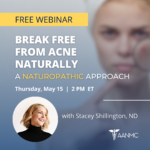At the root of naturopathic medicine is the ability to listen to and be in tune with your body to allow it to reach its optimal state. There is an increasing body of scientific evidence supporting gratitude, resilience and positivity on long-term outcomes of illness and quality of life. Conditions like pain, anxiety and depression can all benefit from a whole-person, mind-body approach. One practice that can have a resounding impact on mental health and overall well-being is the art of being present through mindfulness. When we are fully present and in tune with our body, we can identify and correct an imbalance before it becomes a major issue.
What is Mindfulness?
Mindfulness is learned tool of self-awareness, self-care and empowerment that can be practiced anytime and anywhere. It is a non-judgmental, passive awareness of your present experience.
Why is Mindfulness so Powerful?
Mindfulness allows us to fully engage and focus on the opportunities in front of us. In doing so, we de-emphasize the ‘what ifs’ and revisiting the past, in the present moment. By embracing our power in the here and now, we minimize the stress that comes from worrying about the future or the past. Our focus on the present allows for better connection with our mind, body and environment.
6 Short Mindfulness Exercises
1) Two mindful bites – For the first two bites of any meal or snack you eat, pay attention to the sensory experiences – the texture, taste, smell and appearance of food and the sounds it makes. This practice is also helpful to raise awareness of eating on the go or emotional food behaviors.
2) What one breath feels like – Feel the sensations from one breath flowing into and out from your body. Notice how the air feels in your nostrils, your shoulders, your rib cage, your belly and connect with your breath to ground yourself.
3) Take a mindful moment to give your brain a break – Instead of checking your email or social media in the five minutes between meetings or commitments, try looking out your window and focusing on nature. Use mindfulness to give your brain a break rather than filling up every tiny space in your day by automatically reaching for technology.
4) Air on exposed skin – Pay attention to the feeling of air on your skin for 10-60 seconds. This is best done when wearing short sleeves or with some skin exposed. Why: You’re practicing being in experiential processing mode (as opposed to evaluative “judging” mode, which is our default).
5) Scan your body – This can be done in bed before going to sleep – and can even aid in relaxation for a better night’s rest. Start by getting in a comfortable and relaxed position. Slowly scan your body from head to toe for any sensations of discomfort or tension. Attempt to soften the sensations of discomfort without judgment on why the tension is there, or if you are successful in doing so. Next, scan your body for areas of comfort and ease. Practice gratitude for each of the areas you scan.
6) Do one action mindfully – Pick something you do at the same time every day and plan to do that one thing mindfully. For example, putting on clothes in the morning can be done, focusing on each component and how the clothes feel on your skin.
Mindfulness is like a muscle, the more you practice, the easier it gets.
References
Beddoe, A. & Murphy, S. (2004). Does Mindfulness Decrease Stress and Foster Empathy Among Nursing Students? Journal of Nursing Education, 43(7), 305-312. 13.
Chapman, S.G. (2012) The Five Keys to Mindful Communication. Boston: Shambhala.
Davidson, R., et al. (2003). Alterations in Brain and Immune Function Produced by Mindfulness Meditation. Psychosomatic Medicine, 65, 564-570. Hanh, T.N. (1987) The Miracle of Mindfulness. Boston: Beacon.
Kabat-Zinn, J. (1994) . Paying Attention in a Particular Way: On Purpose, in the Present Moment, and Nonjudgmentally, 4.
Lazar, S., et al. (2005). Meditation Experience is Associated with Increased Cortical Thickness. NeuroReport, 16(17), 1893-1897.
Lutz, A., et al. (2008). Regulation of the Neural Circuitry of Emotion by Compassion Meditation: Effects of Meditative Expertise. PLoS One, 3(3), 1-10.
Ricard, M. (2006) Happiness: A Guide to Developing Life’s Most Important Skill. New York: Little, Brown.
Semple, R., Reid, E., & Miller, L. (2005). Treating Anxiety with Mindfulness: An Open Trial of Mindfulness Training for Anxious Children. Journal of Cognitive Psychotherapy, 19(4), 379-392.
Shapiro, S., et al. (2005). Mindfulness-Based Stress Reduction for Health Care Professionals: Results from a Randomized Trial. International Journal of Stress Management, 12(2), 164-176.






